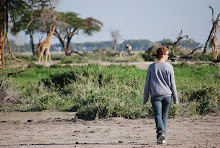In my last three weeks of training in Ambo I had the opportunity to attend both a wedding and a funeral. Each event proved to be vastly different from its American counterpart. I felt that I was very culturally aware after seven weeks of cultural classes, but these events made me realize how much I still have to learn, and more importantly, experience.
Shortly after arriving back here from my site visit I was told that a neighbor had passed away. I still do not know much about her, but she was older and had been sick for a while; I had never met her though. My host family informed me that they were to attend a "Lexo Bet" but they were not able to translate what was going on through their broken English and my broken Amharic. Literally it translates as mourning house, which it turns out is a week-long event. The funeral takes place about three days after someone dies, and then mourning goes on for the next seven days. The event takes place in the home of the deceased, and a tent is erected outside on the street to accommodate additional guests. There is a lot of crying and wailing, but I did not actually go inside the Lexo Bet, I just observed from the outside.
Just last weekend, on my last Sunday in Ambo, I was invited to attend the wedding of a distant relative to my host family. The event started around noon time at the groom's house, which was decorated with a small stage fully furnished with my neighbor's living room set, surrounded by rows of benches for guests and covered with tarps to shade everything from the heat of the day.
It appeared more like a dinner theater set than the scene of a wedding. The groom appeared with all of his groomsmen, and with some loud chants and cheers the groom's guests all paraded out into the street and dispersed into their various cars. As ferengi (foreigners) we were escorted to the lead car with the elders where we had a good view of the entire line of cars following us.
After ten minutes and many car horns later, we arrived at the bride's home which was similarly decorated. Before we were allowed to enter the compound however, we had to get through a crowd of the bride's brothers. All the men had a big mock fight (although at times it seemed a little more hostile and a little less mock) to prove that the groom was strong enough. We then sat around as the bride, groom and the rest of the wedding party paraded in and sat in the sofas set atop the slightly raised stage.
 |
| The men chanting around the groom's car. |
Many parts of the ceremony have been westernized, including the poofy white wedding dress, and obviously rented purple matching bridesmaid dresses. In class we learned about traditional weddings in smaller towns which have less western influence. Next, everyone in attendance took turns filling their plates at a buffet of various Ethiopian dishes. After eating lunch while listening to the very loud local music there was a small ceremony which included exchanging of rings followed by the wedding party parading back outside the compound. And that is just part one.
 |
| Flower girls and ring bearer during the ceremony. |
That part ended around 4 in the afternoon, and then we all rested and reconvened at 6pm at the groom's house. The married couple proceeded into the tented area and all the guests again took turns at a buffet line piled with local food. Dinner was eaten at your bench seat in the crowded yard, followed by much dancing and singing to loud Ethiopian music. It was quite a scene, and I feel honored to have been invited.
 |
| The bride and groom at the evening reception. |












No comments:
Post a Comment